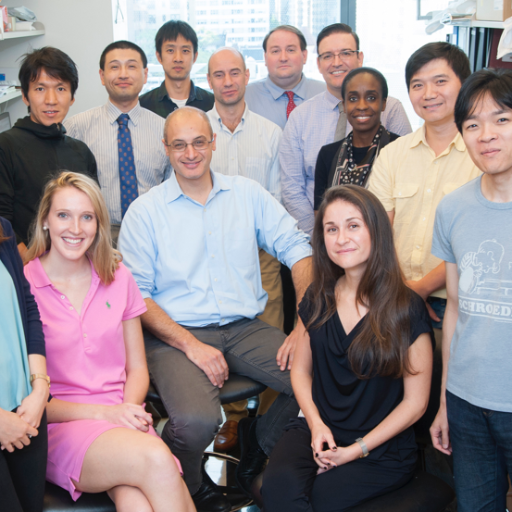
Abdel-Wahab Lab
@AbdelWahablab
Followers
5K
Following
2K
Media
93
Statuses
1K
The Abdel-Wahab Lab studies the functional genomics of hematologic malignancies, focusing on mutations in members of the spliceosomal complex.
New York, NY
Joined June 2016
Excited to share our paper out today in @CellPressNews discovering RNA mis-splicing derived neoantigens & their cognate T cell receptors (TCRs) as well as characterization of endogenous neoantigen T cells in leukemia patients. https://t.co/hVucfdL0oZ
24
41
198
Our phase II trial of Ulixertinib in adults with histiocytosis is open and enrolling so please reach out with any referrals!!: https://t.co/7bTsy5l5ob
0
0
3
Importantly both mice and patients with class 3 MEK mutations respond to ERK inhibition with Ulixertinib. Through FDA compassionate use and help of @BioMedValley, we treated 5 MEK1 E102_I103del mutant patients with Ulixertinib and saw partial or complete responses:
1
0
2
We then created a conditional knockin mouse model of the most common MEK mutation – MEK1 E102_I103del and fund that these mice develop a high penetrance histiocytosis affecting the skin and hematopoietic organs:
1
0
0
Now across an international cohort of 498 patients we identify that RAF-independent MEK mutations (which are common amongst histiocytosis patients) are associated with progression to MEK inhibition:
1
0
0
Clinically led by Eli Diamond and former Abdel-Wahab lab member (now @RutgersCancer) Benjamin Durham + Takeshi Fujino. Prior work by our group led to FDA-approval of vemurafenib for BRAFV600E mutant histiocytosis followed by Cobimetinib for BRAF WT: https://t.co/iDY6seLEl2
1
0
0
Excited to announce a new publication from our @MSKCancerCenter Histiocytosis group identifying a predictor for impaired response to MEK inhibition in histiocytosis patients and the potential for ERK inhibition. Out today in @Cancer_Cell. https://t.co/ajXBBXm3eM
3
1
45
Congratulations to @DaniyanMd & team from @MSKCancerCenter on publication of the initial data from AML patients treated with IL-18 secreting CD371 CAR T cells @MSK. https://t.co/1Ai6kwl7HR 3 / 5 patients experienced MRD-negative morphologic leukemia free state.
2
13
93
If you’re interested in the interplay between regulation (or mis-regulation) of RNA processing and cancer, please check out the 2025 FASEB RNA Processing in Cancer meeting Oct 5-9 2025 in Sacramento CA! https://t.co/nF6SDK7vwB
1
5
7
Excited to share our new study, in close collaboration with @AbdelWahablab and @DaniyanMd led by the exceptionally talented scientists @PuZhang09980432 and @TomZhendong
https://t.co/JLSNt1putl
aacrjournals.org
AbstractGTPase-activating proteins (GAP) and guanine nucleotide exchange factors (GEF) play key roles in cancer development, but their large number and potential redundancy have limited systematic...
4
3
26
Now online in @CD_AACR: Systematic Evaluation of GAPs and GEFs Identifies a Targetable Dependency for Hematopoietic Malignancies - by @PuZhang09980432, @TomZhendong, @DaniyanMd, @AbdelWahablab, @junwei_s, and colleagues https://t.co/bnQmzrEg6f
@PennCancer @MSKCancerCenter
1
12
48
It turns out that ARHGAP45 also encodes the first identified minor histocompatibility antigen (HA-1) and we present a new cell therapeutic approach to target HA-1 and upregulate ARHGAP45 derived epitopes. Thanks to @LLSusa, @theNCI, @MSKCancerCenter for their support.
0
0
10
Excited to announce a new paper in @CD_AACR with @junwei_s, @TomZhendong, @DaniyanMd and led by @PuZhang09980432. We perform screens of GAPs and GEFs in AML and discover a hematopoietic-specific GAP (ARHGAP45) required in AML: https://t.co/sxxdNVQyt1
14
16
137
Amazing speaker lineup with @SKousteni, @rosslevinemd, @The_Will_Lab, @GitlinLab_MSK, @TheDoctorIsVin, @zha_lab, @Amitvermamds, @Doulatov_lab, and others.
0
0
2
Excited to announce our annual New York City Edward P. Evans MDS Centers Symposium across @MSKCancerCenter & @Columbia on Monday, July 14, 2025. This year to be held at @MSKCancerCenter. See this flyer below and register here: https://t.co/uNeFLh0O2z
2
13
66
We are now excited to develop this approach for myeloid leukemia patients with mutations in splicing factors. Thank you to @break_cancer, @ASH_hematology, @LLSusa, @nih_nhlbi, @theNCI, @parkerici, and the Edward P. Evans MDS Foundation
1
0
5
Importantly we were able to identify neoantigen-specific CD8 T cells in patients with active MDS and AML. However, these neoantigen specific T cells had clear evidence of dysfunction, likely explaining the initiation/maintenance of these malignancies
2
0
9
We now find that MDS and AML patients with mutations in the splicing machinery create endogenous mis-splicing derived immunogenic peptides which are shared across patients (“public”) and can be used to isolate tumor-selective TCRs.
1
0
2
In 2021, @bradleybio and our lab identified that pharmacologic modulation of splicing creates bona fide RNA mis-splicing derived neoantigens which can augment immune checkpoint blockade efficacy in syngeneic solid tumor models:
1
0
1
Mutations in genes encoding RNA splicing factors occur in 50-80% of patients with myelodysplastic neoplasms and create stereotyped changes in RNA splicing consistent across patients.
1
0
1
@fredhutch.bsky.social and with amazing TCR expertise from @KlebanoffLab
@mskcancercenter.bsky.social. Also wonderful help from Jeff Molldrem group @MDAndersonNews
2
0
6




